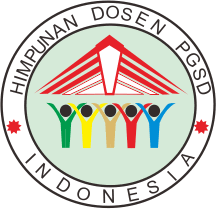Penerapan model pembelajaran problem based learning untuk meningkatkan pemahaman materi indonesia kaya budaya pada peserta didik kelas 4 sekolah dasar
Abstract
Keywords
Full Text:
PDFReferences
Kemendikbud Ristek. (2021). Program Sekolah Penggerak No 162/M/2021. [2] Mardicko. (2020). Konsep Belajar Menurut Perspektif Psikologi: Sebuah Tinjauan. Jurnal Psikologi Pendidikan, 5(2), 87-102. [3] Hilgard, E. R. (1962). Theories of Learning. New York: John Wiley & Sons. [4] Syamsidah. (2018). Problem Based Learning: Teori dan Praktik. Jakarta: PT Bumi Aksara. [5] Hamdani, D. (2011). Strategi Belajar Mengajar. Bandung: Pustaka Setia. [6] Mutiara Pertiwi, K. (Tahun tidak diketahui). Model Pembelajaran Problem Based Learning dan Peningkatan Pemahaman Konsep Sifat dan Perubahan Wujud Benda: Studi Kasus pada Siswa Kelas IV SDN Rendeng Gebang Purworejo. [7] Mauliana. (2018). (Hal. 55). Dalam buku definisi model pembelajaran sebagai kerangka konsep yang sistematis yang digunakan sebagai pedoman dalam menjalani suatu aktivitas. Model pembelajaran dipahami sebagai rencana dalam pembelajaran di mana kegiatan guru dan peserta didik tergambar dengan jelas dalam pelaksanaannya [8] Saputra, H., (2020) Pembelajaran Berbasis Masalah (Problem Based Learning),. Perpustakaan IAI Agus Salim. [9] Widiasworo, E. (2018). Strategi pembelajaran edutainment berbasis karakter (1st ed.). Yogyakarta, Indonesia: Ar-Ruzz Media. [10] Widyartono, D. (2021). Academic Writing Learning Model in Higher Education Based on Hybrid Learning. Journal of Physics: Conference Series 2nd Bukittinggi International Conference on Education (BICED) 2020, 1779(012047), 1–8. [11] Arindra & Abduh, Peningkatan Hasil Belajar Menggunakan Model Pembelajaran Problem Based Learning pada Siswa Sekolah Dasar Universitas Muhammadiyah Surakarta, Indonesia. [12] Junaidi (2020) Implementasi Model Pembelajaran Problem Based Learning Dalam Meningkatkan Sikap Berpikir Kritis. Vol 9, No 1 (2020) e-issn : 2089-967x. [13] Rakhmawati, D., (2021) Advantages and Disadvantages of Problem Based Learning Models. Workshop Penguatan Kompetensi Guru SHEs: Conference Series 4 (5) 550 554 [14] Sugiyono, “ Metode Penelitian Kuantitatif dan R&D,” Bandung : Alfabeta, 2013 [15] Latifah, I - (2018) Integrasi Esd (Education For Sustainable Development) Dalam Pembelajaran Problem Based Learning (Pbl) Untuk Meningkatkan Penguasaan Konsep Dan Profil Sustainability Awareness Siswa Smp Pada Topik Perubahan Iklim. S1 thesis, Universitas Pendidikan Indonesia.
Refbacks
- There are currently no refbacks.



